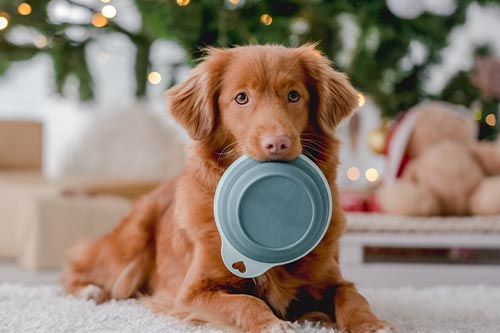Holidays are a time for celebration, and sharing meals with family is a big part of that. However, certain foods commonly found on holiday tables can be dangerous for your dog. In this article, we’ll cover five common holiday foods that are toxic to dogs. It’s important to be aware of these risks so you can keep your pet safe during the festive season. If you suspect your dog has eaten something harmful, contact Lake City Animal Hospital at (386) 755-0236 for more information or to schedule an appointment.

Chocolate
Chocolate is one of the most well-known toxic foods for dogs, and it’s particularly dangerous around the holidays. Whether it’s in cookies, cakes, or a gift box, chocolate contains theobromine, which is toxic to dogs. Dark chocolate and baking chocolate have the highest levels of theobromine, making them more dangerous than milk chocolate. Even small amounts can cause symptoms like vomiting, diarrhea, restlessness, and an increased heart rate. In more severe cases, chocolate ingestion can lead to seizures and heart failure.
It’s important to keep all forms of chocolate out of reach of your dog. During holiday gatherings, chocolate might be left unattended on countertops or tables, making it easy for a curious dog to find. Be sure to inform your guests about the risks and ask them not to feed any chocolate treats to your pet. If your dog accidentally ingests chocolate, contact us at Lake City Animal Hospital right away.
Grapes and Raisins
Grapes and raisins are another holiday food that can be toxic to dogs. They are often found in fruitcakes, holiday desserts, or simply served as snacks. While the exact substance in grapes and raisins that is toxic to dogs is still unknown, even a small amount can lead to kidney failure in some dogs. Symptoms include vomiting, lethargy, loss of appetite, and in severe cases, a failure to produce urine.
Not all dogs react the same way to grapes and raisins, but it’s better to be safe than sorry. Even if your dog has eaten grapes or raisins before without any issues, there is still a risk that they could have a dangerous reaction in the future. Make sure these foods are kept out of your dog’s reach during holiday meals. If you think your dog has eaten grapes or raisins, it’s important to act quickly. Contact our team at Lake City Animal Hospital to discuss what to do next.
Onions and Garlic
Onions, garlic, and related vegetables, such as leeks and chives, are toxic to dogs. These foods contain compounds that can damage your dog’s red blood cells, leading to a condition called hemolytic anemia. This condition can cause weakness, lethargy, and breathing difficulties. Onions and garlic are often used in holiday recipes, from stuffing to gravies and sauces, making them a hidden danger on your dinner table.
Dogs can become sick from both cooked and raw onions or garlic, and even small amounts can cause harm. Be extra cautious when preparing food for holiday meals, and keep your dog out of the kitchen to avoid any accidental exposure. If you notice any symptoms of anemia in your dog, such as pale gums or lethargy, call us immediately for assistance.
Alcohol
Alcohol is commonly present at holiday gatherings, and while it’s meant for human consumption, it’s highly toxic to dogs. Even small amounts of alcohol can cause serious health problems in dogs, such as vomiting, diarrhea, and difficulty breathing. Larger amounts can lead to a dangerous drop in blood sugar, body temperature, and blood pressure, which can be life-threatening.
Alcohol can be found not only in drinks but also in certain holiday desserts, such as rum-soaked cakes or pies. Dogs are often drawn to the sweet smell of alcohol-based treats, making it easy for them to sneak a bite. It’s important to keep all alcohol and alcohol-containing foods far away from your dog. If your dog accidentally ingests alcohol, contact Lake City Animal Hospital right away for guidance on the next steps.
Fatty Meats
Holiday feasts often include rich, fatty meats like turkey, ham, or roast beef. While it might be tempting to share some of these festive foods with your dog, fatty meats can be hard for dogs to digest and can lead to pancreatitis. Pancreatitis is a serious condition where the pancreas becomes inflamed, causing symptoms like vomiting, abdominal pain, and a loss of appetite.
Fat trimmings, skin, and bones are especially risky. Cooked bones can splinter and cause internal damage, while fat can overload your dog’s digestive system. If you want to include your dog in the holiday fun, it’s best to stick to healthy treats made specifically for pets. If your dog shows any signs of digestive distress after eating fatty meats, reach out to Lake City Animal Hospital for help.
Keep Your Dog Safe During the Holidays
The holidays can be stressful enough without worrying about your dog getting into toxic foods. By knowing which foods to avoid, you can keep your pet safe and healthy. It’s important to be extra vigilant during holiday meals and gatherings, as unfamiliar guests might not know the dangers of feeding your dog certain foods.
If you suspect your dog has eaten something harmful, don’t wait for symptoms to appear. Call Lake City Animal Hospital at (386) 755-0236 for more information or to schedule an appointment. Our team is here to help keep your dog safe and healthy during the holiday season.

